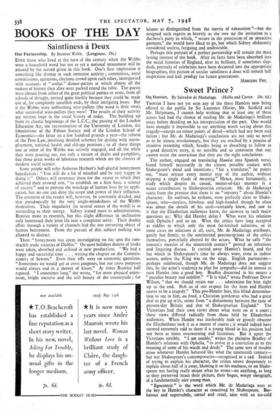BOOKS OF THE DAY
Saintliness a Deux
Our Partnership. By Beatrice Webb. (Longman. 25s.)
EVEN those who lived at the turn of the century when the Webbs were a household word but not as yet a national monument will be amazed by the record given in this book. One's first impression is something like dismay at such immense activity ; committees, royal commissions, agitations, elections crowd upon each other, interspersed with accounts of " useful " dinner-parties at which almost all the makers of history then alive were packed round the table. The guests' were chosen from either of the great political parties or none, from all schools of thought, invited quite frankly because they could be made use of, for completely unselfish ends, by their intriguing hosts. But if the Webbs were unblushing wire-pullers (the word is their own), what successful wire-pullers they were! The results of their activity are written large in the social history of today. The building up from its chaotic beginnings of the L.C.C., the passing of the London Education Act, the reconstitution of the University of London, the finindations of the Fabian Society and of the London School of Economics—the latter on a few hundred pounds a year—the reform of the Poor Law, involving detailed schemes for dealing with unem- ployment, national health and old-age pensions ; in all these things one or other of the Webbs was actively engaged, and all the while they were pouring out, not only a stream of drafts and pamphlets, but those great works of laborious research which are the classics of modern social science.
Some people will echo Auberon Herbert's half-playful honeymoon benediction: " You will do a lot of mischief and be very happy in doing it." Others will reverence them for the extent to which they achieved their avowed aim, " to establish on a firm basis a science of society " and to prevent the wreckage of human lives by its appli- cation, but no one can deny the scope and power of their influence. The attention of the reader will, however, be constantly divided, and that paradoxically by the very single-mindedness of the Webbs themselves. Their singularity (in several senses of the word) is as astounding as their energy. Sidney leaned more to administration, Beatrice more to research, but this slight difference in inclination only buttressed their joint life into a completer unity. Their double effort through a variety of channels had the one unvarying object of human betterment. From the pursuit of this subject nothing was allowed to distract.
Their " honeymoon was spent investigating on the spot the ram- shackle trade societies of Dublin." On most holidays dozens of books were taken, absorbed and utilised in new productions. " We had a happy and successful time . . . writing the chapter on the Commis- sioners of Sewers." Even their tiffs were on economic questions. " Sometimes we would get at cross purposes, but our cross purposes would always end in a shower of kisses." At times Beatrice half repined. " I sometimes long," she wrote, " for more physical enjoy- ment, bright exercise and the still beauty of the countryside ; for leisure as distinguished from the inertia of exhaustion "—but she resigned such regrets as bravely as she tore up the invitation to a duchess's party to which, " secure in the possession of an attractive garment," she would have liked to go, but which Sidney obdurately considered useless, fatiguing and undesirable.
Perhaps this portrait of a perfect partnership will remain the most lasting interest of the book. After its facts have been absorbed into the social histories of England, after its brilliant, if sometimes slap- dash, portraits of celebrities have been decanted into the appropriate. biographies, this picture of secular saintliness a deux will remain half inspiration and.half prodigy for future generations.
MARGERY FRY.


































 Previous page
Previous page